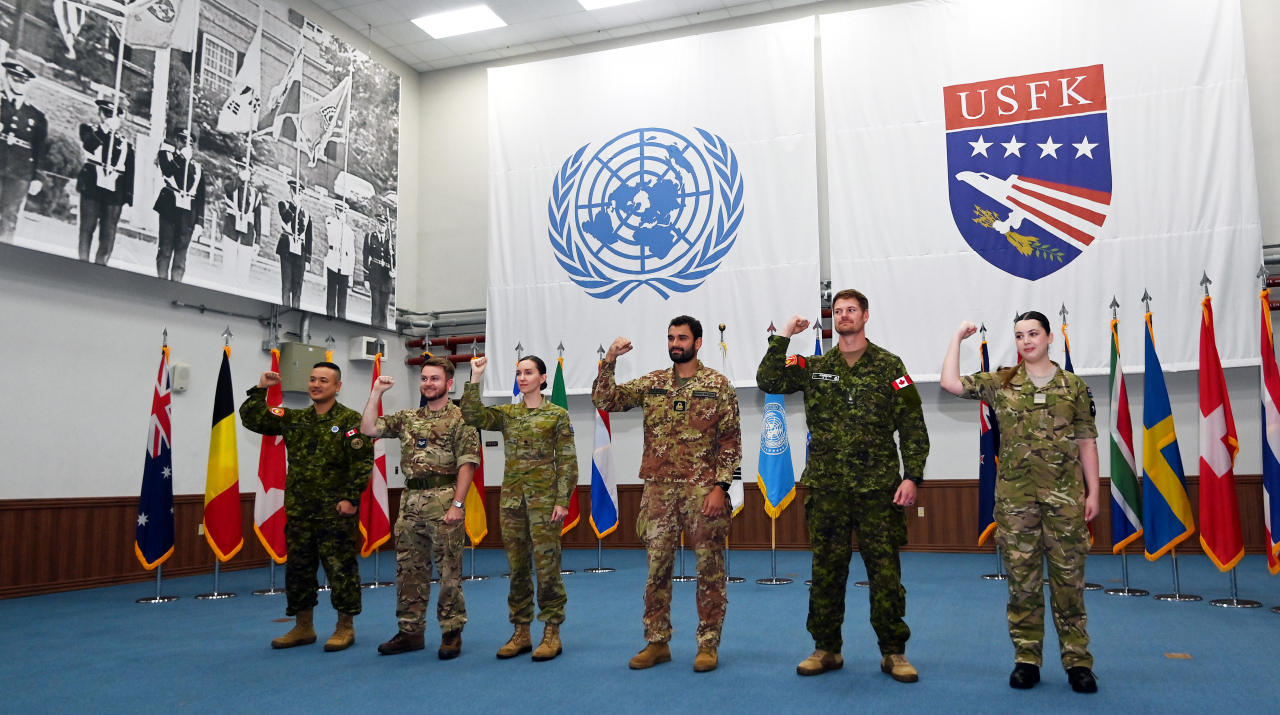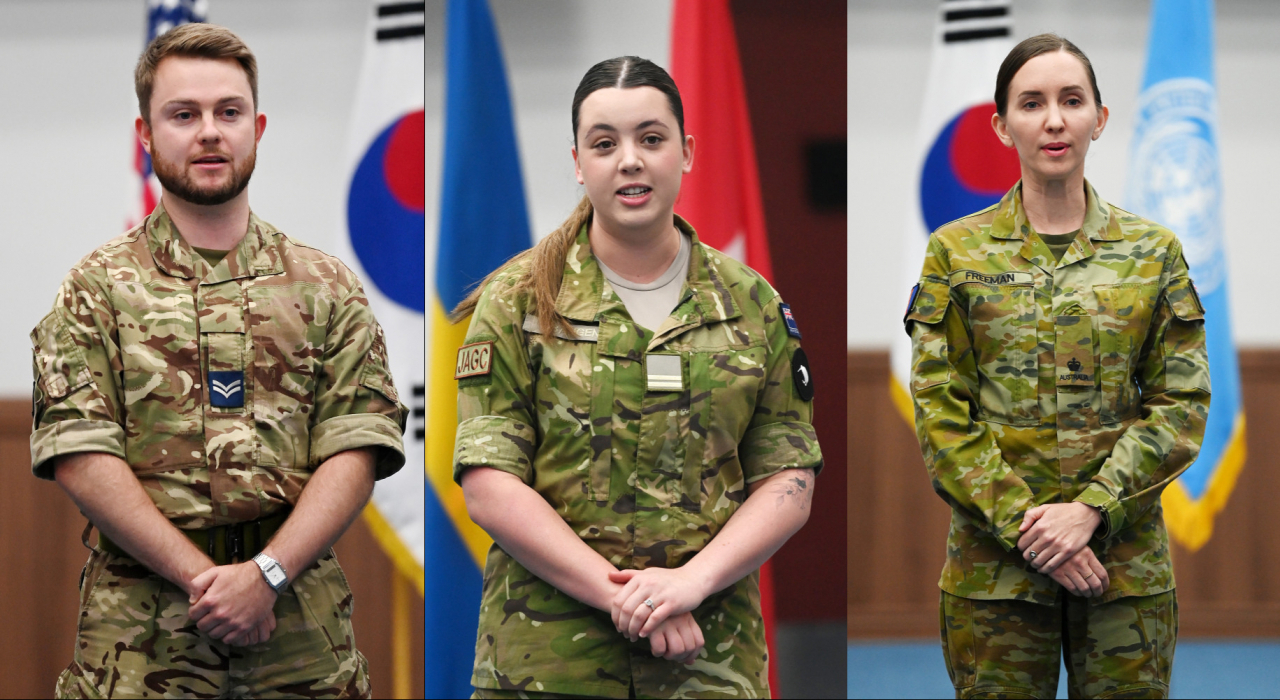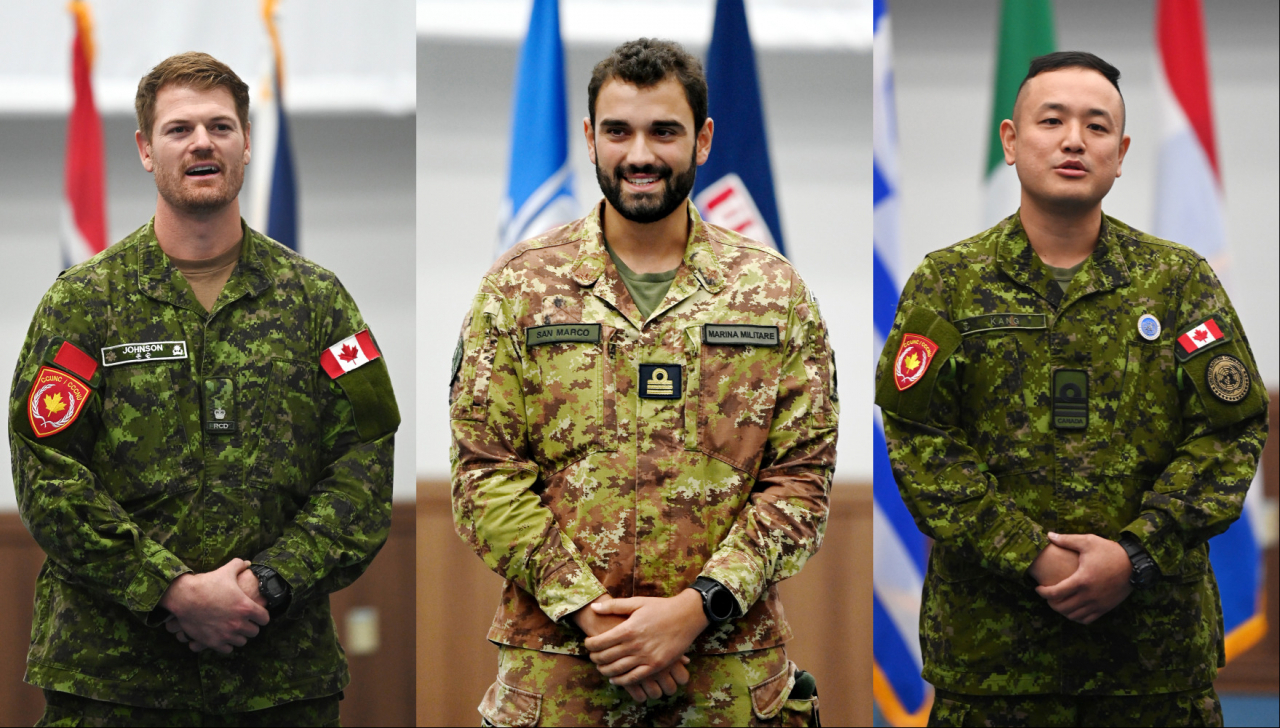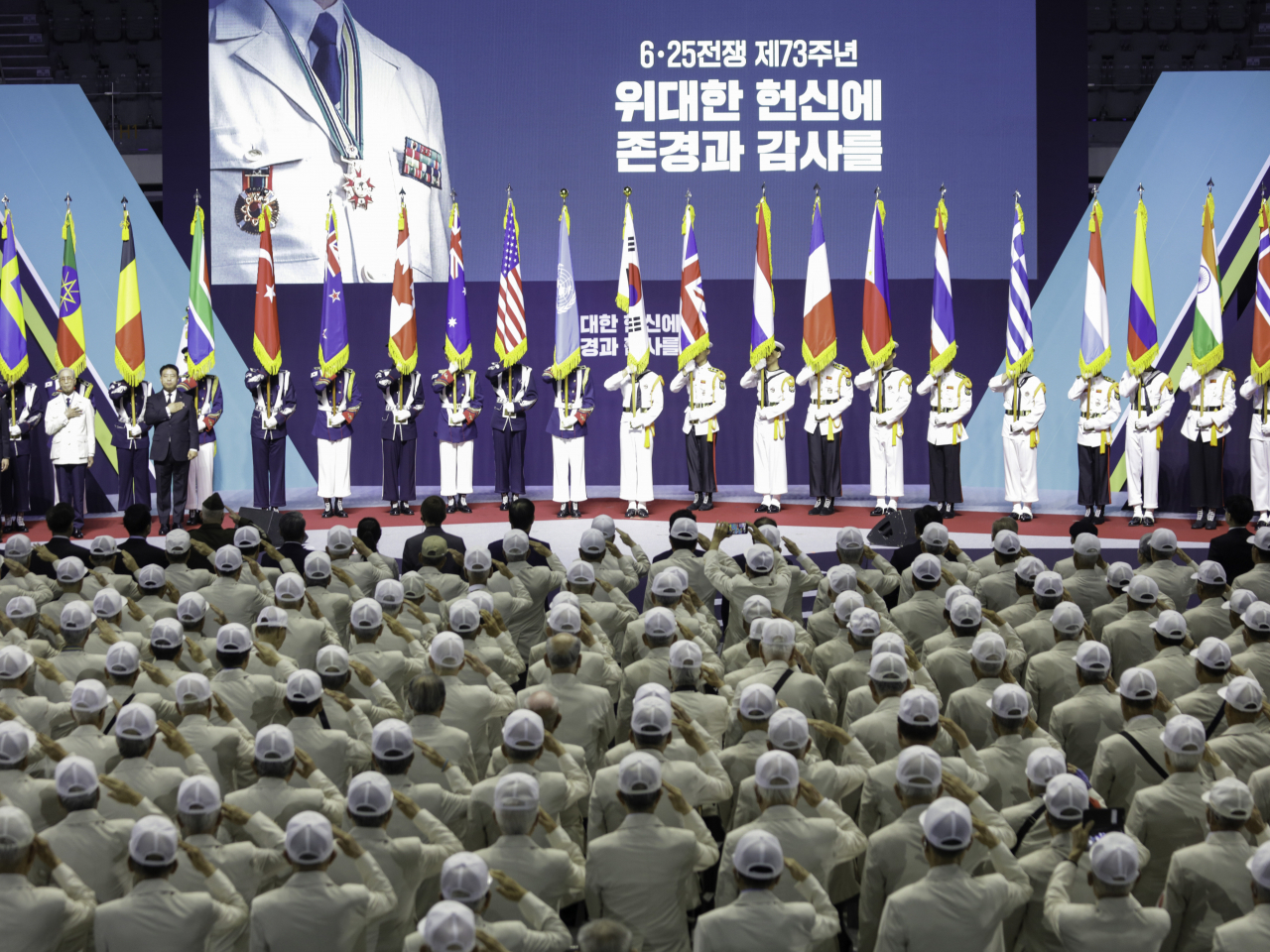Under one flag, UN Command's mission to defend S. Korea continues
Young augmentees in Ulchi Freedom Shield offer insight into UN Command's Korean Peninsula operations
By Ji Da-gyumPublished : Sept. 5, 2023 - 15:24

CAMP HUMPHREYS, Gyeonggi Province — Despite seven decades having passed since the armistice, the countries that once valiantly deployed their combat forces in defense of South Korea in the 1950-53 Korean War still provide steadfast support for the security of the Korean Peninsula.
The United Nations Command was founded in July 1950, one month after North Korea's surprise illegal invasion of South Korea, under UN Security Council Resolutions 82, 83 and 84. The situation marked the first-ever attempt at collective security within the UN system.
The role of the UN Command stationed in South Korea, a country technically still at war with North Korea, continues to be crucial, especially in the face of North Korea's persistent nuclear saber-rattling and the intricate security dynamics of Northeast Asia, which are further compounded by the tightening alignment among North Korea, China and Russia.
Despite its critical importance, the specific efforts made by the UN Command to fulfill its primary missions, which include enforcing the 1953 Korean Armistice Agreement that enabled a cease-fire on the peninsula and providing military support and reinforcements in the event of war, have remained largely undisclosed to the public.
Member states of the UN Command have consistently participated in defense-oriented exercises with South Korea and the United States, such as Ulchi Freedom Shield, in different capacities while embracing the command's motto of unity "under one flag."
"It's really important that we are out here to represent the UK," British Royal Air Force Cpl. Sion Owen, who volunteered as an augmentee for UFS, said during an interview on Aug. 30 at the UN Command headquarters in Pyeongtaek, Gyeonggi Province.
"Obviously, we are one of the member states. So, we all need to get involved and ensure that we're working collectively so that if real-life scenarios came into play, we would all know what we're doing," Owen said.
Ulchi Freedom Shield, an 11-day computer-simulated command post exercise staged by South Korea and the US, concluded on Thursday. UFS is primarily designed to enhance the combined defense posture and readiness of the allies by simulating real-life scenarios that reflect the increasing missile and nuclear threats posed by North Korea and other diverse threats within the security environment.
During the Korean War, there were 16 Sending States — countries that fought alongside the US-led UN Command and shed blood with South Korea — and six other countries that provided vital medical assistance, including medical personnel and essential medications. Among them, 17 countries have remained as UN Command member states.
Among the member states, 10 countries — Australia, Canada, France, Great Britain, Greece, Italy, New Zealand, the Philippines, Thailand and the US — dispatched augmentees from their respective countries to participate in UFS. Augmentees are military personnel dispatched from home and assigned to a unit to participate in UFS.
The 10 member states — each of which deployed soldiers during the Korean War — sent individuals from diverse backgrounds and experts representing various fields, including law and gender equality. They were all united by the common mission of contributing to the peace and stability of the Korean Peninsula.

New Zealand Royal Air Force Flt. Lt. Natacha Baugen served as a legal adviser at the UN Command headquarters during UFS, offering counsel on the legal aspects of any issues commanders faced. Her role encompassed assessing what is legally permissible, defining boundaries and elucidating both the potential and limitations of UN Command actions.
For instance, Baugen concentrated on devising strategies for transferring various materials between countries in specific scenarios. This task entailed evaluating potential domestic and international constraints related to logistics operations and the transfer of materials that UN Command member states could utilize to support South Korea in case of contingencies.
"It's been a really interesting experience because of a variety of different nations supporting the exercise," she said. "Learning about their backgrounds and learning about their -- for me -- their legal considerations have been really fascinating."
Australian Army Maj. Lyndsay Freeman also made significant contributions as an operational gender adviser, pioneering this vital role first introduced during UFS.
Freeman's primary focus was to ensure that military actions underwent a meticulous assessment to prevent any unintended adverse effects on women and the broader civilian population on the ground -- a perspective that might not always be immediately apparent to military leadership during the formulation of strategies and operational plans.
"So my job is to unpack the second-and third-order effects on the entire population."
Freeman also underscored the invaluable nature of collaborating with various countries during UFS, emphasizing the significance of sharing information to bolster the readiness of the multinational command in response to escalating North Korean threats.
"We share information and we can really start to better adapt to probability to make sure that if any threat deploys throughout the Korean Peninsula, all the different UN Command member states can work together to ensure the safety and security of the peninsula."

Other augmentees mentioned that UN Command member states had the opportunity to learn from each other, particularly when it came to the diverse military operating procedures and languages used by each country's military. The opportunity allowed them to bridge differences and enhance interoperability.
"I'd say at every multinational headquarters, there's a friction point," said Canadian Army Maj. Simon Johnson, who worked in the operations cell to maintain the situational awareness of all ongoing UNC operations.
"But the benefit of us being here now is that we're able to smooth out those frictions and any kind of discrepancies and get a better common operating understanding."
For example, Canadians have their specific reporting procedures, while Americans have their own. Therefore, it's crucial to establish a shared doctrine and mutual understanding of how the two militaries communicate and report any issues or similar matters when working together.
Lt. Nicolo Imbriani, from the Infantry Brigade of the Italian Navy, shared a similar perspective. However, he frequently encountered an initial challenge related to language barriers, sometimes taking a minute to fully grasp the communicated information.
Moreover, comprehending the procedures and methods employed by other nations around the world can be quite intricate, often requiring a day or more of discussions to truly understand their perspectives and operational approaches.
Nonetheless, UFS serves as an ongoing learning experience, with each interaction offering valuable lessons.
“Every occasion is very, very good to learn something,” said Imbriani, who worked at the UN Command's Department Operations Center. “It's been the biggest opportunity ever.”

Royal Canadian Navy Lt. Cmdr. Kang Hyung-wook, a communications strategist at the UN Command, highlighted the advantages of a multinational command structure. UN Command member states have consistently grown by leveraging their unique strengths.
Most significantly, UN Command member states have continually improved their preparedness for potential contingencies on the Korean Peninsula while growing together.
Young augmentees and staff highlighted that the UFS exercise provided an opportunity for UN Command member states to collaborate, united by their overarching objective of supporting South Korea.
"In order to ensure the peace and security of the Korean Peninsula at the current juncture, it is essential to foster close cooperation among the Combined Forces Command, UN Command and the South Korean military, moving towards collective development," said Kang, whose grandfather died in battle during the Korean War. "Therefore, exercises like UFS offer an excellent opportunity to intensify training and facilitate further development."
Generations have passed since the 1953 Korean War, during which over 1.95 million mostly young individuals from 22 countries were deployed. Tragically, about 41,000 UN forces lost their lives on the battlefield, and an additional 110,000 suffered injuries or became prisoners of war, bearing the weight of these profound sacrifices.
Despite the passage of time, the resolute determination of young augmentees, many of whom volunteered to participate in UFS, to support South Korea in potential contingencies remains unwavering.
"The biggest lesson I've learned so far is how important it is to continue to do exercises like this because it enables us to really understand how each other operates," Johnson said.
"If things were to escalate on the peninsula, we already have a team of people who have a common understanding of what needs to be done, what the ground looks like, and how the headquarters operates. So I think that the most important thing out of this exercise is the common understanding that everyone develops."



















